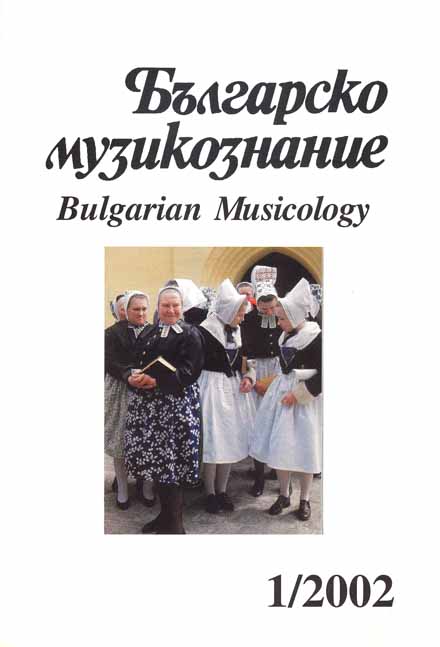Смислови хоризонти на съвременната сорбска музикална култура
Meaningful Horizons of Contemporary Sorbian Music Culture
Author(s): Rosemary StatelovaSubject(s): Music
Published by: Институт за изследване на изкуствата, Българска академия на науките
Summary/Abstract: The article presents the results of a one-month ethnic-musical study of the manifestations of contemporary Sorb musical culture.(Settling there as early as the VI century AD, the Sorb Slav national group inhabits the district of Lausitz in Germany, located in the regions of Sachsen and Brandenburg). The principal objects of the study, carried out on the basis of the cultural-anthropological approach, were the meaningful horizons and the contemporary state of the choral singing of the Sorbs, which developed very successfully during the Serbian National Revival in XIX and XX centuries, being today -according to the words of the composer Detlef Kobjela - "a pillar of Serbian musical culture." Again according to Kobjela the density of the network of choirs among the Sorbs nowadays is greater than the usual for Germany - The Union of Serbian Choral Societies comprises over 25 choral groups. (For comparison, the Sorb population today amounts to 50-60 thousand people, approximately one third from whom actively uses the Serbian “mother tongue".) The observation was carried out among the choirs “Meja”, “Budyśin", “Lipa”, the choir of the Sorb secondary school in the town of Bautzen, the vocal group “Wólbernosće”, Sunday mass in the town of Crostwtz. Conversations were conducted with Sorb and German participants in choirs, conductors and composers, with representatives of Serbian Cultural institutions and the Catholic Church.The principal value, determining the meaningful horizon of Sorbian choral singing today, proceeds from its significance as an important ethnic-cultural feature of individual (and group) self-identification, its functioning as an aesthetic (holiday) stimulus for using the Sorbian language. Consequently, today’s choral repertory is predominantly from the Sorbian national classic, immensely popular and performed on a large-scale by people openly holding a pro-Sorb position. In the light of the above-said, the Serbian amateur choral activities are both being admired as tradition keepers and criticized for conservatism and turning their back on today’s reality. The alternatives facing them are either opening towards contemporary musical art or - just the opposite - their repertory and performance orientation towards today’s popular show culture.
Journal: Българско музикознание
- Issue Year: 2002
- Issue No: 1
- Page Range: 3-36
- Page Count: 34
- Language: Bulgarian
- Content File-PDF

